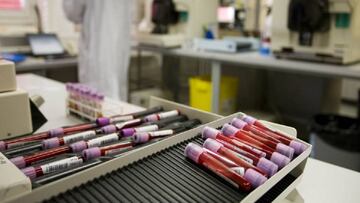Promising breakthrough in early cancer detection
Scientists at the University of Oxford have detected 618 proteins that are related to 19 different types of cancer. They hope to be able to study these proteins to treat cancer in time.

A team of scientists from the University of Oxford have “discovered proteins in the blood that could warn people of cancer more than seven years before it is diagnosed.” After two studies were carried out, experts have managed to discover a total of 618 proteins that are related to 19 different types of cancer.
According to the scientists, of the 618 proteins, 107 of them were detected in several blood samples from a group whose blood had been collected seven years before the patients were diagnosed with cancer. They even believe that these proteins could be “involved at the very earliest stages of cancer, where it could be prevented.” That is why researchers plan to use these proteins to detect cancer much earlier than is possible today.
During the development of the first study, scientists analyzed 44,000 blood samples from the UK Biobank, of which 4,900 had later been diagnosed with cancer. After that, they examined 1,463 proteins in order to detect which were related to the disease and which were not. In the second study, experts analyzed the genetic data of 300,000 cancer cases, and found 40 proteins in the blood that influenced a person’s risk of contracting 9 different types of cancer.
🎙️Tech & Science Daily podcast🎙️
— The Standard (@EveningStandard) May 15, 2024
Blood proteins ‘warn of cancer seven years before diagnosis’
Professor Ruth Travis from @Oxford_NDPH at @UniofOxford explains the research…
🎧Listen to the full episode here: https://t.co/Fnr7zbAXHV pic.twitter.com/gEA9lSrqIA
An advance in cancer detection
After having carried out both studies, the researchers have come to the conclusion that if further research is carried out, in the future it could help with treatment of the disease at a much earlier stage or prevent it completely. But for this it is necessary to conduct more research to find out the exact role of these proteins in the development of cancer.
Related stories
Dr. Keren Papier, senior nutritional epidemiologist at Oxford Population Health and first author of one of the first studies, said they have understood “how the proteins in our blood can affect our risk of cancer. Now we need to study these proteins in depth to see which ones could be reliably used for prevention.”
Along with Dr. Papier, Dr. Joshua Atkins, senior genomic epidemiologist at Oxford Population Health and also a co-author, says that “The genes we are born with, and the proteins made from them, are hugely influential in how cancer starts and grows. Thanks to the thousands of people who gave blood samples to UK BioBank, we are building a much more comprehensive picture of how genes influence cancer development over many years.”


Complete your personal details to comment